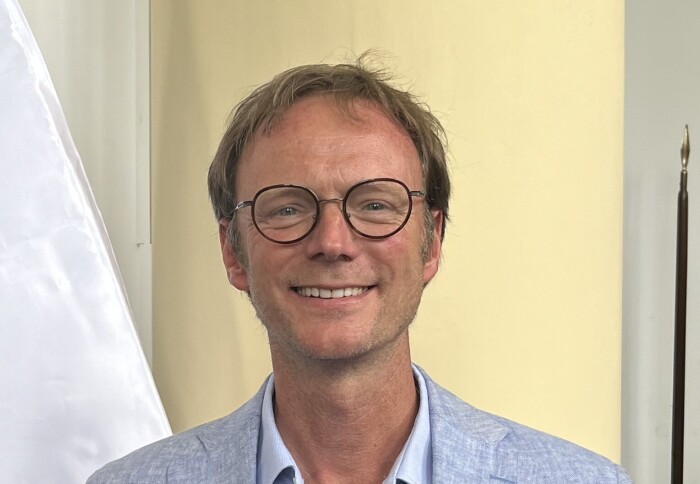Dr Chris Butler appointed Clinical Reader in Chronic and Complex Diseases
by Jack Stewart

Dr Christopher Butler has been appointed Clinical Reader in Chronic and Complex Diseases and Programme Director for Multiple Long-Term Conditions.
Dr Butler's appointment will be across the George Institute UK, the School of Public Health and the Department of Brain Sciences.
As Clinical Reader, Dr Butler will build a dynamic new programme of work on multiple long-term conditions (which is the co-existence of multiple health conditions, including non-communicable diseases, mental health conditions, and chronic infectious diseases) with a focus on low- and middle-income countries and underserved populations in high-income countries, including communities in North-West London.
“The increased numbers of people worldwide with multiple long-term conditions is leading to one of the most important and interesting challenges in the health sciences. Most people over the age of 65 have two or more chronic conditions, but multiple long-term conditions also affect the young, particularly in low- and middle-income countries. We urgently need to understand how and why specific diseases cluster together, how multiple long-term conditions impact upon peoples’ lives, and how health services must be reconfigured to meet this growing problem.
“I am enormously excited to be leading and developing a cross-disciplinary research programme on multiple long-term conditions at The George Institute UK and Imperial. As a neurologist, I also aim to bring into focus the crucial interplay between mental and physical health, and the poorly understood impact of multiple long-term conditions on brain function”, said Dr Butler.
A global challenge
Dr Butler will lead this programme across the Institute’s offices in Australia, China, India and the UK, as well as globally, albeit being primarily based in London, UK.
Professor Otavio Berwanger, Executive Director of The George Institute for Global Health, UK, said: “Dr Butler will be joining us to build our transdisciplinary programme addressing the knowledge gaps and priority questions around the global challenge of multiple long-term conditions. Chris’s extensive experience as a practising clinician and esteemed health sciences researcher will greatly inform the development and delivery of our work in this area and, ultimately, contribute to our mission to improve the health of millions of people worldwide.
“I am particularly looking forward to collaborating on work to optimise clinical trial design to ensure inclusion of patients with multiple long-term conditions. This is crucial to helping realise equitable trials, as well as enhance real-world applicability of findings.”
Most recently Dr Butler was Clinical Reader in Dementia Research at Imperial College London where he led the Global Brain Health research group in the Department of Brain Sciences. His research aims to improve the diagnosis and clinical outcomes of people living with cognitive disorders, with a particular focus on neurodegenerative diseases, epilepsy and transient amnesic syndromes. Dr Butler is also a practising neurologist in the Imperial Memory Service at Charing Cross Hospital, Imperial College Healthcare NHS Trust.
The issue of multiple long-term conditions represents a significant global health challenge: it is common in countries all over the world and its prevalence is influenced by factors rooted in equity. Indeed, they are more prevalent in people experiencing socioeconomic hardship and are also influenced by sex and gender, ethnicity and race, and complex health-related behaviours that increase the risk of individual chronic and acute conditions.
Further, while the burden is global in scope, populations in low- and middle-income countries are disproportionately affected compared to those in high-income countries, while being least likely to receive optimal treatment and more likely to suffer fatal or disabling disease outcomes.
Professor Deborah Ashby, Dean of the Faculty of Medicine at Imperial College London, said: “This role calls for extensive and meaningful working with staff across Faculties and Departments at the College, as well as with multi-disciplinary international research teams. We are delighted that Chris will hit the ground running, building on his existent networks to progress this crucial programme and bolster teaching and policy in this area at the College.”
Article text (excluding photos or graphics) © Imperial College London.
Photos and graphics subject to third party copyright used with permission or © Imperial College London.
Reporter
Jack Stewart
School of Public Health